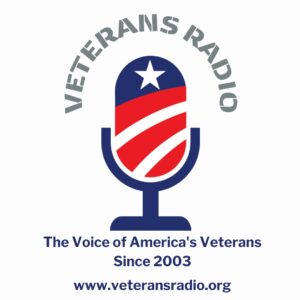Global War on Terror - Silver Star - Army
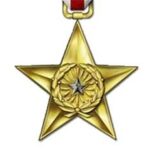 The records below contain the Army recipients of the Silver Star during the Iraq and Afghanistan conflicts, collectively known as the Global War on Terror.
The records below contain the Army recipients of the Silver Star during the Iraq and Afghanistan conflicts, collectively known as the Global War on Terror.
* Indicates Killed in Action (KIA), Missing in Action (MIA), Prisoner of War (POW), or Died Non-Battle (DNB)
![]()
ECHOLS, JAVIER
Synopsis:
The President of the United States takes pleasure in presenting the Silver Star Medal to Javier Echols, Staff Sergeant, U.S. Army, for conspicuous gallantry and intrepidity in action while serving with the 108th Military Police Company (Air Assault) in support of Operation IRAQI FREEDOM on 30 April 2005. In the early morning hours of 30 April, Staff Echols, Sergeant Matthew Acosta and Sergeant Zachariah Collett , as part of squad Warlord 11, were patrolling a Main Supply Route when an Improvised Explosive Device detonated nearby. An Iraqi National Guard transport vehicle filled with Iraqi Soldiers was hit by the blast. Sergeant Echols led his team in the rescue of four Iraqi National Guard Soldiers who were wounded in the explosion. Amidst a dangerous crossfire between insurgents and ING Soldiers, the trio managed to move the wounded to safety and administer medical aid until an evacuation helicopter arrived on the scene. For one wounded Iraqi Soldier, the team crafted a makeshift stretcher from a piece of metal that had been blown from the transport truck in the explosion.
ECKERT, MARKUS
Synopsis:
The President of the United States of America, authorized by Act of Congress July 9, 1918 (amended by an act of July 25, 1963), takes pleasure in presenting the Silver Star to Sergeant First Class Markus Eckert, United States Army, for conspicuous gallantry and intrepidity in action against the enemy in support of Operation FREEDOM'S SENTINEL in 2015. His gallant actions and dedicated devotion to duty, without regard for his own life, were in keeping with the highest traditions of military service and reflect great credit upon himself, his unit, and the United States Army.


Synopsis:
The President of the United States takes pleasure in presenting the Silver Star Medal to Gannon Edgy, Staff Sergeant, U.S. Army, for conspicuous gallantry and intrepidity in action while serving with the 1st Battalion, 15th Infantry Regiment, 3d Brigade, 3d Infantry Division, during combat operations in support of Operation IRAQI FREEDOM, on 3 April 2003, in Iraq. On that date, Staff Sergeant Edgy's special operations scout platoon was participating in a 24-hour road march to seize a key highway intersection when a six-person team was sent ahead of the convoy to do road reconnaissance and check for enemy resistance. At about 0930 hours the scout platoon was ambushed by Republican Guard forces that were hidden in positions along a 650 foot stretch of roadway. After one tank was hit by enemy fire, Staff Sergeant Edgy and his two-vehicle scout team assumed responsibility to protect the rest of the combat train. Staff Sergeant Edgy called up his contact report and dismounted his vehicle to engage five enemy soldiers within 15 meters of his vehicle. He then began directing his own gunner and his wingman's gunner to engage the increasing number of enemy dismounts on the southern side of the road. Through Staff Sergeant Edgy's leadership and quick thinking under combat conditions, he contributed immeasurably to the saving of the lives of his fellow soldiers, as well as extricating his team without injury. His exceptional leadership on the ground prevented the position from being overrun and saved the lives of all who were in the vehicles trapped along the road. Staff Sergeant Edgy displayed exceptional abilities to command and control under fire which resulted in the destruction of a well-executed ambush of the Task Force 1-15 TOC and Combat trains along Route CUBS by enemy insurgents.
Home Town: Brunswick, Georgia


Synopsis:
The President of the United States takes pleasure in presenting the Silver Star Medal to David M. Edwards, Staff Sergeant, U.S. Army, for conspicuous gallantry and intrepidity in action while serving with the 3d Battalion, 75th Ranger Regiment, during combat operations in support of Operation IRAQI FREEDOM, in Iraq, in 2005. Staff Sergeant Edwards' unit was conducting combat operations when his element came under an intense enemy attack. While under direct fire, his outstanding leadership, dedication to duty and commitment to excellence were fundamental in saving the life of a wounded Ranger and success of the task force
EIERMANN, MICHAEL A.
Citation:
The President of the United States of America, authorized by Act of Congress July 9, 1918 (amended by an act of July 25, 1963), takes pleasure in presenting the Silver Star to Sergeant First Class Michael A. Eiermann, United States Army, for gallantry in action on 19 May 2010 during combat operations against an armed enemy of the United States as a Platoon Sergeant for a Joint Task Force in support of Operation ENDURING FREEDOM. During a coordinated attack involving multiple insurgent fighters and countless rounds of indirect fire, Sergeant Eiermann, with total disregard for his own personal safety, entered a known minefield in order to extract two critically wounded Soldiers. His actions undoubtedly aided in saving their lives amidst a complex enemy attack. Sergeant First Class Eiermann's distinctive accomplishments are in keeping with the finest traditions of military service and reflect great credit upon himself, this Command, and the United States Army. NARRATIVE TO ACCOMPANY AWARD: Sergeant First Class Michael A. Eiermann distinguished himself by exceptionally heroic gallantry as a Ranger Platoon Sergeant on May 19 2010, while deployed to Afghanistan in support of Operation ENDURING FREEDOM. Sergeant First Class Eiermann was assigned to a Joint Task Force whose mission is to capture or kill terrorists. Sergeant First Class Eiermann's heroic actions under direct and indirect enemy fire during a complex and coordinated enemy attack on Bagram Airfield undoubtedly saved the lives of two critically wounded Soldiers by orchestrating their successful casualty evacuation from a known, active minefield. On May 19, 2010, Bagram Airfield was attacked with effective direct and indirect fire from over 20 armed insurgent fighters. After breaching the outer perimeter of BAF's defenses, the platoon-sized element of enemy fighters initiated a coordinated attack against multiple friendly guard towers and observation points. In an attempt to maneuver against the attacking enemy, a friendly element suffered two critical casualties as a result of an anti-personnel mine located in an active minefield immediately bordering the inner perimeter of BAF. At the initiation of the attack, Sergeant First Class Eiermann, located within the walls of the compound, witnessed tracer rounds and rocket-propelled grenades flying over his position. Sergeant First Class Eiermann immediately instructed his men to retrieve their weapons and seek cover, while simultaneously doing the same. As the engagement continued, a large explosion was heard, and Soldiers positioned on the inner walls of BAF's security perimeter began calling for a Medic. Reacting to calls for a Medic, Sergeant First Class Eiermann located one of his Platoon Medics and initiated movement through the known, active minefield in order to provide medical treatment for the two wounded Soldiers. After moving through an active minefield under continued enemy small arms, machine gun, and rocket-propelled grenade fire, Sergeant First Class Eiermann directed and coordinated the treatment of the two critically wounded Soldiers. Without regard for his own personal safety, Sergeant First Class Eiermann led his Medic through minefield, clearing the route to the casualties with his footsteps. Sergeant First Class Eiermann continued to expose himself to sporadic direct and indirect enemy fire by making multiple trips through the minefield in order retrieve litters for the two friendly casualties. Once the casualties had received their initial on-site treatment, Sergeant First Class Eiermann and his platoon medic moved the casualties through the route Sergeant First Class Eiermann had previously cleared to the compound. From there, the casualties were loaded into an awaiting ambulance for more advanced medical care. It was not until his platoon medic and the two casualties were evacuated to safety that Sergeant First Class Eiermann returned to cover. After evacuating all casualties, Sergeant First Class Eiermann continued to lead and provide guidance for his men throughout the remainder of the enemy engagement. Without Sergeant First Class Eiermann's heroic orchestration of the successful casualty evacuation while under effective direct and indirect enemy fire within a known, active minefield, two wounded soldiers would have undoubtedly sustained additional injuries from enemy fire or possibly succumbed to their severe wounds. Sergeant First Class Michael A. Eiermann's bravery under fire, courageous actions, and dedication to his fellow Soldiers were exemplary. He is most deserving of the special recognition afforded by the awarding of the Silver Star Medal. Through his distinctive accomplishments, Sergeant First Class Michael A. Eiermann's actions and leadership reflect great credit upon himself, his unit and the United States Army.
Home Town: Constantinople, New York


Synopsis:
The President of the United States takes pleasure in presenting the Silver Star Medal to Jerad Eldred, Staff Sergeant, U.S. Army, for conspicuous gallantry and intrepidity in action while serving with the 1st Battalion, 3d Special Forces Group (Airborne), during combat operations in support of Operation ENDURING FREEDOM, in Afghanistan. Staff Sergeant Eldred, a medic, was part of a detachment working with Afghan national army soldiers to seize Sperwan Ghar mountain when the soldiers were ambushed. Staff Sergeant Eldred jumped out of his vehicle to check on the soldiers, then ran across open ground to check on Afghan soldiers. He also positioned himself on a rooftop to establish communications with the ground forces commander. When communication was lost, he exposed himself to enemy fire in order to communicate with his team members. He suffered a severe concussion during the battle but continued to help troops.
ELLIS, JUSTIN A.
Synopsis:
The President of the United States of America, authorized by Act of Congress July 9, 1918 (amended by an act of July 25, 1963), takes pleasure in presenting the Silver Star to Sergeant Justin A. Ellis, United States Army, for conspicuous gallantry and intrepidity in connection with military operations against an armed hostile force while serving in support of Operation IRAQI FREEDOM in Iraq. Sergeant Ellis' gallant actions and dedicated devotion to duty, without regard for his own life, were in keeping with the highest traditions of military service and reflect great credit upon himself, his unit, and the United States Army.
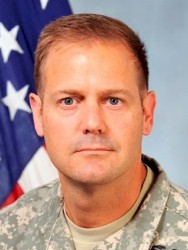


Synopsis:
The President of the United States of America, authorized by Act of Congress July 9, 1918 (amended by an act of July 25, 1963), takes pleasure in presenting the Silver Star to Chief Warrant Officer Four Douglas M. Englen, United States Army, for conspicuous gallantry and intrepidity in connection with military operations against the enemy while serving with Company A, 2d Battalion, 160th Special Operations Aviation Regiment (Airborne), in support of Operation ENDURING FREEDOM in Afghanistan. His gallant actions and dedicated devotion to duty, without regard for his own life, were in keeping with the highest traditions of military service and reflect great credit upon himself, his unit, and the United States Army.



Synopsis:
The President of the United States of America, authorized by Act of Congress July 9, 1918 (amended by an act of July 25, 1963), takes pleasure in presenting a Bronze Oak Leaf Cluster in lieu of a Second Award of the Silver Star to Chief Warrant Officer Four (CW-4) Douglas M. Englen, United States Army, for conspicuous gallantry and intrepidity in connection with military operations against the enemy while serving with the 3d Battalion, 160th Special Operations Aviation Regiment (Airborne), in support of Operation ENDURING FREEDOM in Afghanistan 14 September 2011. On that date he was a member of one of two aircraft dispatched to recover a Navy explosive ordnance disposal (EOD) technician who had been badly injured by an antipersonnel IED in a very active region with a large confirmed insurgent presence. The technician was successfully recovered and, despite the loss of his leg, received life-saving medical treatment. Chief Warrant Officer Five Englen's gallant actions and dedicated devotion to duty, without regard for his own life, were in keeping with the highest traditions of military service and reflect great credit upon himself, his unit, and the United States Army.
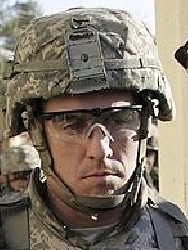

Citation:
The President of the United States of America, authorized by Act of Congress July 9, 1918 (amended by an act of July 25, 1963), takes pleasure in presenting the Silver Star to Captain James Robert Enos, United States Army, for conspicuous gallantry and intrepidity in connection with military operations against an armed hostile force while serving with Company D, 1st Battalion, 9th Infantry Regiment, 2d Brigade Combat Team, 2d Infantry Division, in support of Operation IRAQI FREEDOM at Ar Ramadi, Iraq, on 4 December 2006. His leadership and valor are in keeping with the finest traditions of military service and reflect great credit upon himself, Task Force 1-9 Infantry, the Raider Brigade, the Multi-National Corps - Iraq, and the United States Army. NARRATIVE TO ACCOMPANY AWARD: Captain James Robert Enos displayed exceptional valor, courage, and leadership while engaged with the enemy of the United States and Iraq as the Company Commander for Dog Company, 1st Battalion, 9th Infantry Regiment, Ar Ramadi, Iraq, on 4 December 2006. On 4 December 2006, Dog Company was participating in Operation SACKETTS HARBOR - a Battalion Operation to attack to clear the insurgent stronghold of SOFIA and SAJARIAH. Dog Company had been in sporadic small arms and IED contact with the enemy in the preceding days. The company was positioned in three mutually supporting strong points that were 500 - 800 meters apart. The company was conducting reconnaissance patrols to find and gain contact with the enemy that was known to be in the area. At approximately 1515, his first platoon came under accurate sniper fire, took one urgent casualty, and requested an immediate air CASEVAC. Within the next 15 minutes, the entire first platoon had become pinned by heavy enemy fire from two directions. Captain Enos declared a TIC and began to take control of ISR and CAS. Four tanks from the Battalion QRF were ordered to begin moving to his position. He cancelled the air CASEVAC, determining it was too dangerous and directed a ground MEDEVAC element to move to and evacuate the Soldier. This element also came under heavy enemy fire and fought their way into the platoon. At about 1545 this element reached the casualty and now the second and third platoons started receiving heavy and accurate small arms fire and grenades. While under heavy enemy fire, he high crawled around the rooftop to command and control his company that was now fully engaged by a determined enemy from multiple directions. Captain Enos maneuvered the four tanks into position to destroy an enemy machine gun position. At approximately 1630 the entire company continued to be in heavy contact. Captain Enos' position and his second platoon's position were now being engaged with accurate enemy 82-mm. and 120-mm mortar fire which caused two friendly KIAs with second platoon and several more wounded. For the next hour, with his entire company locked in close combat, Captain Enos high crawled on the room under fire directing devastating close air support, mortar, and artillery strikes onto identified enemy positions. At the same time, he continued to direct the tanks and the fires of his three platoons to suppress and destroy additional enemy positions. Under these covering fires, he directed the CASEVAC for four badly wounded Soldiers which saved their lives. Throughout this entire action, Captain Enos demonstrated strong and calm leadership while directing a chaotic battle and personally under constant enemy fire. His leadership kept the company in the fight and the enemy was killed and driven from the battlefield that day. His leadership and valor are in keeping with the finest traditions of military service and reflect great credit upon himself, Task Force 1-9 Infantry, the Raider Brigade, the Multi-National Corps - Iraq, and the United States Army.
Home Town: Steilicom, Washington
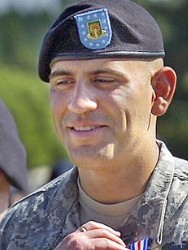

Citation:
The President of the United States of America, authorized by Act of Congress July 9, 1918 (amended by an act of July 25, 1963), takes pleasure in presenting the Silver Star to Sergeant Michael Alexander Espejo, Jr., United States Army, for conspicuous gallantry and intrepidity in action against the enemy while serving as a Team Leader with 1st Squad, 1st Platoon, 66th Military Police Company, 42d Military Police Brigade, 82d Airborne Division, Forward Operating Base Torkham, Afghanistan, in action against enemy forces in support of Operation ENDURING FREEDOM on 27 September 2007. Sergeant Espejo's professionalism and valor in dealing with the instantaneous threat of a suicide bomber disguised as an Afghanistan National Police Officer were paramount in saving the lives of numerous personnel. Sergeant Espejo's actions and rapid decision to eliminate the threat ensured no loss of life to coalition personnel and noncombatants. He selflessly put the lives of others above his own, and his courage on the battlefield reflected the highest standards and values. Sergeant Espejo's actions are in keeping with the finest traditions of military service, and reflect great credit upon himself, the 66th Military Police Company, Task Force DRAGOON, Task Force FURY, Combined Joint Task Force-82, and the United States Army. NARRATIVE TO ACCOMPANY AWARD: On 27 September 2007, 1st Squad, 1st Platoon, 66th Military Police Company, was conducting a Combat Logistics Patrol from Forward Operating Base FENTY to Forward Operating TORKHAM when they encountered a VBIED that had exploded and was burning on the side of the road. While 1st Squad was establishing a security cordon, Sergeant Espejo and another team leader, Sergeant Todd, were conducting a search of the area and noticed a man wearing an Afghan National Police uniform, lying on his back with his palms down approximately five feet from the burning vehicle. The individual appeared to be a victim of the VBIED and was just starting to sit up. Sergeant Todd ran to get the Combat Lifesaver Bag as Sergeant Espejo approached the individual. Since the individual was starting to sit up, Sergeant Espejo decided to pick the individual up and carry him away from the fire. Sergeant Espejo placed the individual's left arm over his shoulder, grabbed around his torso, and started to walk him away. When Sergeant Espejo placed his hand around the individual's torso, he felt something bulky underneath his shirt then noticed a wire running out of the sleeve of his left arm and identified a switch type device in the palm of his hand. At about this time, Sergeant Todd was returning to Sergeant Espejo's position. Sergeant Espejo threw the individual away from himself and Sergeant Todd and they both immediately raised their weapons and took cover behind some concrete pillars. Sergeant Espejo was yelling to the individual in Pashtu and English to stop and raise his hands with his palms forward. The individual was initially compliant, so Sergeant Espejo and Sergeant Todd started to bound back. On Sergeant Todd's last bound back, the individual dropped his hands down to his lap and attempted to push the device in his palms. Sergeant Espejo then, having gone through all of the levels of Escalation of Force, then eliminated the threat. Sergeant Espejo and Sergeant Todd then continued to bound back to their vehicles, where they held security until EOD arrived on scene and removed the Suicide Vest from the individual. Sergeant Espejo's courage and rapid decision to eliminate the threat of the suicide bomber disguised as an Afghan National Policeman, were paramount in saving the lives of numerous Coalition personnel and noncombatants.
Home Town: Bakersfield, California
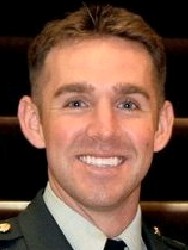

Citation:
The President of the United States of America, authorized by Act of Congress July 9, 1918 (amended by an act of July 25, 1963), takes pleasure in presenting the Silver Star to Second Lieutenant Nicholas Michael Eslinger, United States Army, for gallantry in connection with military operations against an opposing armed force while serving as a Platoon Leader in Company C, 2d Battalion, 327th Infantry Regiment, 101st Airborne Division, on 1 October 2008, in Samarra, Iraq, during Operation IRAQI FREEDOM VII. Without regard for his own personal safety, during a grenade attack on his dismounted patrol, Second Lieutenant Eslinger saved the lives of the soldiers under his command by moving to the grenade, covering it with his body and throwing it back in the direction of the enemy. Second Lieutenant Eslinger's actions prevented at least six soldiers from being severely wounded or killed. Following these actions, Second Lieutenant Eslinger continued the pursuit of the enemy combatant, leading to his detention. Second Lieutenant Eslinger's bravery is in keeping with the finest traditions of military heroism and reflects distinct credit upon him, the Multi-National Corps Iraq, and the United States Army. NARRATIVE TO ACCOMPANY AWARD: Second Lieutenant Nicholas Michael Eslinger distinguished himself by exceptional gallantry in action against an enemy of the United States as a Platoon Leader, Charlie Company, 2d Battalion, 327th Infantry Regiment, 1st Brigade Combat Team, 101st Airborne Division (Air Assault), Multi-National Corps--Iraq, Baghdad, Iraq, on 1 October 2008 during Operation IRAQI FREEDOM. Under limited visibility conditions, while moving dismounted through heavily populated streets of the historic city of Samarra, Iraq, in the Hiberia II neighborhood, 1st platoon was attacked with a single anti-personnel hand grenade thrown into the middle of their movement formation. The attack came from an enemy combatant, hidden behind a courtyard wall, who waited for the center of the patrol to pass in front of him. This enemy action took the entire patrol by surprise and had the potential to severely wound or kill up to six members of the platoon. After the grenade landed within the formation, Second Lieutenant Eslinger quickly assessed the situation, realizing that if the grenade detonated where it landed, it would kill or injure at least six Soldiers that were in the blast radius. With complete disregard for his personal safety and well-being, Second Lieutenant Eslinger ran towards the grenade located approximately six feet in front of him, and covered it with his body. When the grenade did not immediately go off, he threw it back over the wall in the direction of the enemy. Second Lieutenant Eslinger did this fully knowing that there was a high probability that the grenade could detonate and kill him as he tried to save his Soldiers. Upon throwing the grenade, Second Lieutenant Eslinger immediately yelled for all of his men to get down and take cover from the pending blast. As they were following his order, the grenade detonated; no Soldiers were wounded or killed by the grenade's explosion. Following the blast, Second Lieutenant Eslinger took immediate action to eliminate the enemy threat. He directed one squad to move to the position where the grenade had been thrown and organized another squad to move to the enemy's most likely egress route. His element found the point of origin for the attack and began tactical questioning of individuals in the area. The intelligence gained from his site exploitation led to the detention of the individual that threw the grenade in less than twelve hours from the time of the incident. Despite the incredible danger, Second Lieutenant Eslinger took actions under extreme circumstances that saved the lives of his Soldiers. His initial instinct to sacrifice himself for his comrades is truly valorous. He demonstrated unsurpassed determination, courage, and small unit combat leadership in saving the lives of his Soldiers and then aggressively pursuing the enemy. His incredible bravery inspired all of his Soldiers, as well as the entire company, to continue the pursuit of dangerous enemy elements remaining in Samarra. Second Lieutenant Eslinger's bravery is in keeping with the finest traditions of military heroism and reflects distinct credit upon him, the Multi-National Corps-Iraq, and the United States Army. In May 2019, Eslinger's award was upgraded to a Distinguished Service Cross.


Synopsis:
The President of the United States takes pleasure in presenting the Silver Star Medal to Erasmo Espino, Jr., Staff Sergeant, U.S. Army, for conspicuous gallantry and intrepidity in action while serving as a Medical Sergeant with the 3d Battalion, 7th Special Forces Group (Airborne), during combat operations in support of Operation ENDURING FREEDOM, on 19 May 2006, in Afghanistan. On that date, Staff Sergeant Erasmo was serving as a Medical Aidman to a team of about two dozen Special Forces soldiers who were ambushed in the Uruzgan Province, Afghanistan, by an estimated 150 o 200 Taliban Fighters. Disregarding his own safety, Staff Sergeant Espino grabbed his aid bag and moved from his covered position to treat other casualties in the kill zone.
Home Town: Eagle Pass, Texas


Citation:
The President of the United States takes pride in presenting the Silver Star Medal (Posthumously) to Justin M. Estes, Staff Sergeant, U.S. Army, for gallantry in action while serving with Company C, 2d Battalion, 505th Parachute Infantry Regiment, 3d Brigade Combat Team, 82d Airborne Division, in action on 5 March 2007 while on combat patrol operations during Operation Iraqi Freedom 06-08. Staff Sergeant Estes' instinctual actions and personal courage undoubtedly prevented a future attack on Coalition Forces, Iraqi Security Forces or innocent civilians at the cost of his own grievous injuries. Staff Sergeant Estes' actions are in keeping with the finest traditions of military heroism and reflect distinct credit upon him, Task Force 2d Battalion, 505th Parachute Infantry Regiment, Task Force Lightning, and the United States Army.
NARRATIVE TO ACCOMPANY AWARD:
Staff Sergeant Estes distinguished himself by conspicuous gallantry and intrepidity at the risk of his life above and beyond the call of duty of 5 March 2007, while serving as a Squad Leader in 1st Platoon, Charlie Company, 2d Battalion, 505th Parachute Infantry Regiment, during a complex improvised explosive device (IED) attack in the city of Samarra, Iraq during Operation Iraqi Freedom 06-08. Staff Sergeant Estes' platoon was tasked with conducting reconnaissance of the berm on the eastern side of the volatile city of Samarra in order to prevent the flow of insurgent forces into the city. During the patrol, the lead HMMWV struck a pressure activated IED resulting in the catastrophic destruction of the vehicle, followed by a secondary command-detonated IED targeting the casualty evacuation (CASEVAC) team. Staff Sergeant Estes was the truck commander of the third truck in the patrol when the first IED was struck, placing him 100 meters behind the lead HMMWV to provide security for the patrol. The first IED engulfed the lead HMMWV in flames, leaving burning debris scattered around the detonation site. Five Paratroopers were injured in the blast, two of whom were thrown from the truck; they were still alive, but on fire and among the burning debris. Without hesitation and aware of the imminent danger posed not only by the flames and exploding ordnance, but also secondary IEDs, Staff Sergeant Estes grabbed the fire blanket and ran through the inferno surrounding the destroyed vehicle to render medical aid. Staff Sergeant Estes feverishly attempted to save the life of Staff Sergeant Stanley, providing medical care until the platoon medic arrived. Staff Sergeant Estes then took charge of the combat lifesaver team and began moving casualties out of the wreckage and flames for treatment. Staff Sergeant Estes provided calm and decisive leadership at the detonation site, directing the continuing search for Paratroopers affected by the blast, even as ammunition cooked off around him. Having cleared the casualties from the fire, and with his equipment literally melting from the intense heat, Staff Sergeant Estes remained at the side of Staff Sergeant Stanley as he called the stretcher teams forward to conduct CASEVAC. As the teams approached, the imminent danger at which Staff Sergeant Estes had placed himself in order to save the lives of his comrades was realized, as he was engulfed in a cloud of smoke and debris as a secondary IED detonated directly underneath his feet, killing him instantly. In an ultimate act of bravery and selfless service to his comrades in which he gave his own life, Staff Sergeant Estes attempted to save the lives of five of his comrades. By his undaunted courage, intrepid fighting spirit, and unwavering devotion to duty, Staff Sergeant Estes gallantly gave his life for his country, upholding the highest traditions of military heroism and reflecting distinct credit upon himself, Task Force Two Panther, Task Force Lightning, and the United States Army.
Home Town: Sims, Arkansas
Personal Awards: Silver Star (War on Terrorism), Purple Heart
EVELYN, ALEX G.
Synopsis:
The President of the United States of America, authorized by Act of Congress July 9, 1918 (amended by an act of July 25, 1963), takes pleasure in presenting the Silver Star to Staff Sergeant Alex Gordon Evelyn, United States Army, for conspicuous gallantry and intrepidity in connection with military operations against an armed hostile force while serving in support of Operation IRAQI FREEDOM in Iraq. Staff Sergeant Evelyn's gallant actions and dedicated devotion to duty, without regard for his own life, were in keeping with the highest traditions of military service and reflect great credit upon himself, his unit, and the United States Army.


Synopsis:
The President of the United States takes pride in presenting the Silver Star Medal (Posthumously) to Christopher Falkel, Corporal, U.S. Army, for conspicuous gallantry and intrepidity in action while serving with 1st Battalion, 3d Special Forces Group (Airborne), during combat operations in support of Operation ENDURING FREEDOM in Afghanistan on 8 August 2005.
Born: September 24, 1982 at Massachusetts Home Town: Highlands Ranch, Colorado
Personal Awards: Silver Star (War on Terrorism), Purple Heart
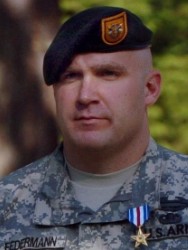

Citation:
The President of the United States of America, authorized by Act of Congress July 9, 1918 (amended by an act of July 25, 1963), takes pleasure in presenting the Silver Star to Staff Sergeant Chris L. Federmann, United States Army, for conspicuous gallantry and intrepidity in action against the enemy while serving with as the Detachment Weapons Sergeant, Special Forces Operational Detachment Alpha 165 (ODA-165), under Advance Operating Base 160, in support of Operation IRAQI FREEDOM, while under intense enemy fire during Operation JACKAL, at Ad Diwaniyah, Iraq. Staff Sergeant Federmann repeatedly subjected himself to direct enemy fire while maneuvering to engage and kill enemy personnel. His actions prevented anti-Iraqi forces from overwhelming and destroying friendly positions. Although wounded in the course of the operation, Staff Sergeant Federmann continued to provide vital covering fire to protect the lives of his fellow Operational Detachment Alpha and Coalition Force Soldiers. Staff Sergeant Federmann's heroism is in keeping with the finest traditions of military service and reflects great credit upon himself, the Special Operations Command Central, and the United States Army. NARRATIVE TO ACCOMPANY AWARD: On June 3, 2007, during an operation to capture a suspected terrorist leader in the city of Ad Diwaniyah, Iraq, Sergeant First Class Chad M. Kite and Staff Sergeant Chris L. Federmann heroically distinguished themselves by exceptionally valorous conduct amidst the bravery exhibited by all the Soldiers participating in this battle. Sergeants Kite and Federmann were part of the primary assault force, consisting of seventeen Soldiers--four US Special Forces Soldiers, 3 Special Operation Team-Alpha Soldiers, three coalition Soldiers, and seven Iraqi Soldiers. A second assault force, consisting of nearly thirty US and coalition soldiers were staged in another part of the city waiting as the quick reaction force. Using a hallmark trait of Special Forces, the assault force infiltrated into the target area using an indigenous vehicle. This tactic was used to prevent the local populace and any insurgent force from detecting their presence. The team quickly moved into the area, and assaulted the target building when the team began taking fire from multiple directions. Sergeants Kite and Federmann, along with two other coalition soldiers, moved 100 meters under hostile fire. Sergeant Kite continued to suppress the enemy, while Sergeant Federmann threw multiple hand grenades neutralizing the enemy threat. They called the second assault force forward to their location. As a result, enemy fire increased and one Iraqi troop was mortally wounded. The now forty man force of US and coalition Soldiers began taking heavy sniper and Rocket Propelled Grenade (RPG) fire from a nearby building. A Special Forces Soldier launched a shoulder fired missile at the building from which the sniper and RPG fire were originating. However, despite the missile strike, the enemy sniper and RPG fire from the building did not stop. A coalition sniper fired from a nearby rooftop at the enemy forces, but could not eliminate the threat. US fighter jets could not attack the building due to the close proximity to civilian homes. Sergeants Kite and Federmann again moved under heavy enemy fire to engage the enemy. Sergeant Kite fired at the enemy, enabling Sergeant Federmann to fire multiple high explosive rounds from his M-79 grenade launcher. Sergeant Federmann then launched a smoke grenade onto the rooftop, marking the building for coalition helicopters to place precise machine gun fire into the building, destroying the remaining enemy presence. After moving back to the assault force, Sergeants Kite and Federmann noted that insurgent forces had taken position on the rooftop of a building less than 15 meters away. The surrounding insurgent forces moved to close the distance with the coalition forces. Realizing the deadly threat developing, Sergeant Kite suppressed the rooftops and intersection, while Sergeant Federmann fired his M-4 carbine and threw multiple grenades at both locations, again neutralizing the threat. At this point, the assault force began regrouping to leave the area. So far, the force had sustained two wounded Soldiers, including a coalition soldier shot in the chest who continued to fight off the enemy for more than two hours, and one Iraqi soldier killed in action. The force mounted their military vehicles and the indigenous vehicle. Under heavy fire, the assault force withdrew from the area returning fire from the sides of their vehicles. During withdrawal from the target area, Sergeant Federmann was wounded in the arm from a bullet fragment.
Home Town: Cincinnati, Ohio


Citation:
The President of the United States takes pleasure in presenting the Silver Star Medal to Bradley M. Felix, Sergeant First Class, U.S. Army, for conspicuous gallantry and intrepidity in action while serving as the Assistant Operations/Intelligence Sergeant for Operational Detachment Alpha 345 (ODA-345), Advanced Operational Base 340, Forward Operational Base 32, during combat operations in support of Operation ENDURING FREEDOM V, in Afghanistan, on 20 September 2004. Sergeant First Class Felix's personal bravery and selfless actions are in keeping with the highest traditions of the military service and reflect great credit upon himself, the 3d Special Forces Group (Airborne), and the United States Army.
NARRATIVE TO ACCOMPANY AWARD:
Sergeant First Class Bradley M. Felix distinguished himself by exceptionally valorous achievement as the Assistant Operations/Intelligence Sergeant for Operational Detachment Alpha 345 (ODA-345) 3d Special Forces Group (Airborne), Advanced Operational Base 340, Forward Operational Base 32, in support of Operation ENDURING FREEDOM V. On the afternoon of 20 September 2004, ODA 345 and a platoon of Afghan National Army (ANA) soldiers were conducting a reconnaissance patrol through the Mangretay Valley in the Paktika Province, Afghanistan to confirm or deny the presence of Anti-Coalition Militia (ACM) fighters reported to be operating in the area. Sergeant First Class Felix was driving the lead vehicle in the patrol when the patrol was ambushed by 25 ACM in fortified fighting positions located on terrain which dominated the valley. A rocket-propelled grenade (RPG) hit his vehicle, disabling it and wounding the entire crew. Ignoring his own injuries, Sergeant First Class Felix struggled to position his vehicle as it rolled to a stop in order to shield his wounded comrade from further exposure to the intense small arms and RPG fire. With complete disregard for his own safety and ignoring his wounds that would eventually cause him to be evacuated to the United States for treatment, Sergeant First Class Felix dismounted the vehicle and fired a Light Anti-tank Weapon into the fortified enemy position, which was raking his vehicle with machinegun fire. After silencing the position, Sergeant First Class Felix sprinted from vehicle to vehicle while under intense enemy fire to organize the counterattack. Inspired by Sergeant First Class Felix's courageous actions, the ANA soldiers began assaulting the fortified enemy positions causing the enemy to break off their attack. Refusing medical treatment for his own injuries, Sergeant First Class Felix continued to direct the fires of the patrol in support of the ANA attack as he redistributed ammunition throughout the patrol. Once the enemy broke contact, Sergeant First Class Felix organized the patrol into a defensive perimeter to allow for the evacuation of his more seriously wounded comrades, including two who later died from their wounds received. After refusing to get on the MEDEVAC helicopter, Sergeant First Class Felix led the patrol back to the firebase. The heroic actions taken by Sergeant First Class Felix, all under intense fire and after being seriously wounded were decisive in the ability of the patrol to gain the tactical advantage and force the enemy to break contact by inflicting numerous casualties to the enemy force. His courage and deportment under fire is in the finest tradition of the Special Forces and reflects great credit upon, himself, the Combined Joint Special Operations Task Force-Afghanistan, and the United States Army.
Home Town: Corpus Christi, Texas
Personal Awards: Silver Star (War on Terrorism), Purple Heart


Synopsis:
The President of the United States takes pleasure in presenting the Silver Star Medal to Christopher Fernandez, Private First Class, U.S. Army, for conspicuous gallantry and intrepidity in action while serving with Battery A, 1st Battalion, 21st Field Artillery, 1st Cavalry Division, during combat operations in support of Operation IRAQI FREEDOM, at Baghdad, Iraq, on 5 May 2004. On that date Private First Class Fernandez was on a patrol through Baghdad's Saidiyah neighborhood when insurgents ambushed his unit. An improvised explosive device hit the patrol's rear vehicle. Immediately following the explosion, the patrol was barraged with small-arms fire. The patrol's crew-served weapons, an M-240B machine gun and a .50 caliber machine gun, immediately returned fire. The IED explosion killed two U.S. Soldiers, wounded five others and rendered their vehicle inoperable. Private Fernandez returned fire with his weapon, an M-249 squad automatic weapon and reloaded his weapon at least once during the short engagement. In all the chaos, Private Fernandez saw the stricken vehicle's M-240B machine gun was unused. He knew that another weapon would suppress the enemy's fire long enough to evacuate the wounded and leave the area. He left his vehicle, ran to the disabled humvee, recovered the weapon and its ammunition and opened fire on the enemy. The weapon's hand guards, insulators covering the machine gun's barrel were blown of in the explosion, Private Fernandez kept firing, despite the fact that his hands were burning. Almost 10 minutes later, the wounded were loaded onto the Private Fernandez's vehicle, and the ambush site was abandoned.
Born: at Tucson, Arizona
Home Town: Tucson, Arizona
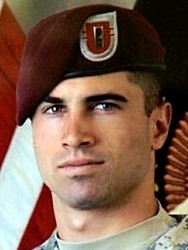

Citation:
The President of the United States of America, authorized by Act of Congress July 9, 1918 (amended by an act of July 25, 1963), takes pride in presenting the Silver Star (Posthumously) to First Lieutenant (Infantry) Matthew Charles Ferrara, United States Army, for exceptionally valorous conduct during Operation ENDURING FREEDOM VIII while assigned as a Platoon Leader in Chosen Company, 2d Battalion (Airborne), 503d Parachute Infantry Regiment, 173d Airborne Brigade Combat Team. First Lieutenant Ferrara's courageous leadership and calm demeanor under fire were instrumental in repelling an overwhelming attack by an enemy force three times larger than his own. During three hours of intense combat First Lieutenant Ferrara expertly led his men in the defense of the Aranas Outpost until he was able to call for air strikes danger close to his own position to neutralize the enemy threat. His actions reflect great credit upon himself, the Rock Battalion, the Bayonet Brigade Combat Team, and the United States Army. NARRATIVE TO ACCOMPANY AWARD: On 22 August 2007, at 0455 Lima the Ranch House Outpost at Aranas, Afghanistan, was attacked from all sides by a company sized insurgent force, simultaneously engaging every post in the perimeter by multiple RPGs and small arms fire. First Lieutenant Ferrara was serving as the Platoon Leader First Platoon, C Company, 2d Battalion (Airborne), 503d Parachute Infantry Regiment, 173d Airborne Brigade Combat Team. On that morning he woke up to the sound of intense small arms fire and RPG explosions. When he moved outside of his quarters he came under effective small arms fire and he saw Afghan National Army (ANA) and Afghan Security Guard (ASG) forces fleeing from their post, which had swiftly been overrun by the insurgents. First Lieutenant Ferrara immediately contacted his higher command to report the situation. He deployed his men around the TOC and contacted all for reports but quickly lost communication with Post 3 and Post 4. First Lieutenant Ferrara recognized the need to employ fires to disrupt enemy's movement. He directed fire on enemy targets with the 120-mm. mortars at Bella Outpost. The TOC began to take effective RPG fire from the ANA post that had been overrun by the enemy and communications were knocked out when an RPG destroyed his antenna. Recognizing that the fight would be lost if he could not maintain communications with higher elements he took a radio out of the TOC and reestablished the PLT CP at a location from which he had better awareness of the battle and could better direct the defense. First Lieutenant Ferrara concluded that all the effective fire was coming from the south east of the Ranch House and that the ANA and ASG posts had been overtaken by the insurgents and that these would make excellent targets for CAS when the A-10s arrived. First Lieutenant Ferrara explained the enemy situation to the pilots and gave them targets marking his own location with a VS17 panel. He directed air strikes against the enemy while taking effective fire from the insurgents firing 10 meters from his location. His precise reporting allowed the A-10s to strafe insurgents that had advanced to within 10 meters of US forces. He continued to use CAS to destroy the enemy by conducting two additional gun runs within danger close range of friendly troops. The gun runs stopped the enemy advance causing them to retreat from their attack. Despite taking 50% casualties to the US forces from enemy fire, First Lieutenant Ferrara quickly moved from a defensive to offensive posture. He assembled a team and directed them to clear through the rest of the perimeter to find all enemy and collect all casualties. After casualties were evacuated, First Lieutenant Ferrara received a quick reaction force that he employed to occupy fighting positions in the event of another enemy attack. He continued to conduct fire missions, call CAS and CCA onto the enemy as they retreated to the south and south east towards the village of Aranas. First Lieutenant Ferrara's precise assessment of the situation and rapid decision to employ danger close CAS and mortar fire stopped the enemy from overrunning the Ranch House outpost. His calm demeanor under fire and effective reporting allowed his higher command to push assets to him which he quickly employed to destroy the enemy. This action yielded invaluable intelligence with the death of MVT Hazrat Omar and at least 10 of his fighters, as well as enemy video tapes of attack plans, pictures of insurgents, and payroll documents utilized by insurgent commanders.
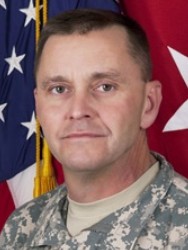

Synopsis:
The President of the United States of America, authorized by Act of Congress July 9, 1918 (amended by an act of July 25, 1963), takes pleasure in presenting the Silver Star to Lieutenant Colonel Terry Richard Ferrell, United States Army, for conspicuous gallantry and intrepidity in connection with military operations against the enemy in March 2003 while serving as Commanding Officer, 3d Squadron, 7th Cavalry Regiment, 3d Infantry Division, in support of Operation IRAQI FREEDOM in Iraq, in March 2003. Lieutenant Colonel Ferrell's gallant actions and dedicated devotion to duty, without regard for his own life, were in keeping with the highest traditions of military service and reflect great credit upon himself, the 3d Infantry Division, and the United States Army.


Synopsis:
The President of the United States of America, authorized by Act of Congress July 9, 1918 (amended by an act of July 25, 1963), takes pleasure in presenting the Silver Star to Lieutenant Colonel Charles Parker Ferry, United States Army, for conspicuous gallantry and intrepidity in connection with military operations against an armed hostile force while serving in support of Operation IRAQI FREEDOM in Iraq from 18 to 25 February 2007. Lieutenant Colonel Charles Ferry commanded the 1st Battalion, 9th Infantry Regiment, 2d Infantry Division, in Operation MURFREESBORO, in Ramadi, Iraq. Lieutenant Colonel Ferry's gallant actions and dedicated devotion to duty, without regard for his own life, were in keeping with the highest traditions of military service and reflect great credit upon himself, the 2d Infantry Division, and the United States Army.


Synopsis:
The President of the United States takes pleasure in presenting the Silver Star Medal to Jason Fetty, Staff Sergeant, U.S. Army (Reserve), for conspicuous gallantry and intrepidity in action while serving with the 364th Civil Affairs Group, Joint Provisional Reconstruction Team KHOST, during combat operations in support of Operation ENDURING FREEDOM, on 20 February 2007, in Afghanistan. At the opening of a new medical center at the Khost City Hospital in Afghanistan, Staff Sergeant Fetty was working a security detail, on hand to protect the governor of Khost and several Afghan dignitaries. After spending 10 months working with locals building the center, Staff Sergeant Fetty noticed a man in a white lab coat who didn't look familiar. He began going through his escalation of force commands: "Stop." "Get down." The doctor ignored him, and tried to grab him. Staff Sergeant Fetty wanted to fire a warning shot, but feared it would ricochet and hit the hospital or someone gathered in the crowd around it. Staff Sergeant Fetty was working with members of the 82nd Airborne Division, who were new to the area. He realized that he was the only soldier in a position to stop what could be a suicide bomber from attacking the ceremony. Rather than shirking him off, he used the distance his weapon created between him and his attacker to his advantage. He slowly maneuvered toward a clearing between the hospital and the nearby administrative huts, away from the crowd. Assuming that the man was wearing a suicide vest that might explode at any time, as the struggle continued, Staff Sergeant Fetty recognized he probably wouldn't survive. Clear of the crowd, he hit the man with the butt of his weapon, then fired warning shots at the ground near his feet. When the two broke apart from the scuffle, Staff Sergeant Fetty shot the attacker in the leg to subdue him. When the man got up again, the other soldiers, noticing the fight, fired on the attacker who exploded. Staff Sergeant Fetty took three steps before making a dive. The blast came as he hit the ground, peppering him with shrapnel in the face, leg and ankle. All that remained where he had struggled with the attacker was a big hole in the ground. By leading the attacker from the crowd, Staff Sergeant Fetty allowed for the evacuation of all medical personnel and dignitaries, which included the governor of the province, the primary target of the bombing.
Born: at Parkersburg, West Virginia
Home Town: Parkersburg, West Virginia
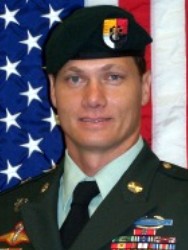


Citation:
The President of the United States of America, authorized by Act of Congress July 9, 1918 (amended by an act of July 25, 1963), takes pleasure in presenting the Silver Star to Master Sergeant Paul D. Fiesel, United States Army, for gallantry in action while serving as a Team Sergeant with Operational Detachment Alpha 3214 (ODA-3214), 3d Special Forces Group (Airborne), Special Operations Task Force - 33, Combined Joint Special Operations Task Force - Afghanistan, in support of Operation ENDURING FREEDOM on 2 November 2007, in Southern Afghanistan. Sergeant Fiesel's personal courage and commitment to mission accomplishment in a combat zone, under the most extreme of circumstances, greatly contributed to the success of Operation ENDURING FREEDOM. His actions are in keeping with the finest traditions of military heroism and reflect distinct credit upon himself, Special Operations Task Force - 32, the Combined Joint Special Operations Task Force - Afghanistan, Special Operations Command Central, and the United States Army. NARRATIVE TO ACCOMPANY AWARD: Sergeant First Class Paul D. Fiesel, United States Army, heroically distinguished himself by exceptionally valorous conduct in the face of the enemy of the United States (US) as the Operations Sergeant, Operational Detachment Alpha (SFODA) 3214, Special Operations Task Force - 32, Kandahar Airfield, Afghanistan, in support of Operation ENDURING FREEDOM on 2 November 2007. During this time, executing Operation FIRST LOOK in the vicinity of the village of Sarsina, Afghanistan, Sergeant Fiesel's SFODA responded to an urgent request for reinforcements from a sister SFODA in contact with the enemy. The sister SFODA along with their Afghan National Army (ANA) Soldiers were pinned down by an estimated 300 to 400 fighters and required immediate assistance to evacuate their dead and wounded. At the time of the call for reinforcements, Sergeant Fiesel was manning a dismounted Observation Post (OP) over watching the village. Sergeant Fiesel immediately moved on foot from his OP to link up with the rest of his detachment and moved to assist the sister SFODA. As he and his ANA Soldiers were maneuvering, they came under intense and heavy enemy fire from a tree-line and series of irrigation ditches to their north. Sergeant Fiesel immediately emplaced his ANA Soldiers in a support by fire position to begin suppressing the intense volume of enemy fire coming from numerous prepared enemy fighting positions. Once the support by fire position was emplaced, Sergeant Fiesel and his ANA Soldiers boldly maneuvered to flank the enemy and clear the dug-in fighting positions. As the sister SFODA's situation in the village became increasingly dire, Sergeant Fiesel was ordered to halt his counter attack in order to reinforce the sister SFODA so they could withdraw and evacuate their dead and wounded. Sergeant Fiesel linked up with his detachment and Ground Mobility Vehicle (GMV) crew behind a small wall approximately 400 meters from the pinned down SFODA and quickly task organized an extraction force. Sergeant Fiesel and his ANA Soldiers dashed across 400 meters of open ground, through an intense and withering barrage of enemy fire, simultaneously engaging enemy fighters with their M4 carbines. Upon reaching the building, he linked up with the US and ANA Soldiers taking cover in irrigation ditch to the rear of the building. After ensuring 100 percent accountability of all personnel, Sergeant Fiesel led the US and ANA Soldiers back through the intense hail of enemy gunfire that he had just crossed moments before to a semi-covered position near the GMVs. He quickly cross loaded the wounded personnel and prepared to move to a more secure location. Throughout this period he remained exposed and outside the protection of the GMVs in order to provide effective covering fires as the rest of the element mounted the vehicles. With elements of both SFODAs mounted on the trucks, there was no open seat for Sergeant Fiesel. Without hesitation and despite receiving accurate mortar fire, he immediately ordered the vehicles to begin moving out of the enemy engagement area. Using the GMVs for cover and engaging enemy personnel with his M4 carbine as he ran, they reached a covered and concealed position and prepared to establish a Helicopter Landing Zone (HLZ) to evacuate the dead and wounded. His actions are in keeping with the finest traditions of military heroism and reflect distinct credit upon himself, Special Operations Task Force - 32, the Combined Joint Special Operations Task Force - Afghanistan, Special Operations Central Command, and the United States Army.
Born: At Pasadena, Texas
Home Town: La Porte, Texas



Citation:
The President of the United States of America, authorized by Act of Congress July 9, 1918 (amended by an act of July 25, 1963), takes pleasure in presenting a Bronze Oak Leaf Cluster in lieu of a Second Award of the Silver Star to Master Sergeant Paul D. Fiesel, United States Army, for gallantry in action as Team Sergeant, Special Forces Operational Detachment Alpha 3434 (ODA-3434), 3d Special Forces Group (Airborne), Special Operations Task Force-South, Kandahar Airfield, Afghanistan in support of Operation ENDURING FREEDOM. Master Sergeant Fiesel distinguished himself by attacking a numerically superior enemy force which held a vast tactical advantage, with no thought of his own personal safety. He exposed himself to accurate and intense small arms fire and rocket propelled grenade fire over 500 meters of uphill terrain, with little cover, in order to rescue a pinned down four-man element, saving their lives. His actions are in keeping with the finest traditions of the military heroism and reflect distinct credit upon himself, the Combined Joint Special Operations Task Force-Afghanistan, the Combined Special Operations Component Command-Afghanistan, and the United States Army. NARRATIVE TO ACCOMPANY AWARD: Master Sergeant Paul D. Fiesel heroically distinguished himself by exceptionally valorous conduct in the face of the enemy of the United States as Team Sergeant, Special Forces Operational Detachment-Alpha 3434, Special Operations Task Force-South, Kandahar Airfield, Afghanistan in support of Operation ENDURING FREEDOM. On 27 September 2011, while conducting a joint reconnaissance patrol in northwest Khakrez District, Kandahar Province, Afghanistan, a four-man overwatch element from Sergeant Fiesel's patrol became decisively engaged and pinned down by two numerically superior enemy elements with heavy weapons and rocket propelled grenades. With no thought to his own personal safety, Sergeant Fiesel made the self-sacrificing decision to expose himself to intense, accurate enemy fire to draw the focus of the enemy from the pinned down element. Sergeant Fiesel led his own 4-man element in an assault on an 8-man enemy element, assaulting over 3 kilometers, the last 500 meters containing minimal cover, allowing the enemy to capitalize on the effectiveness of their weapons systems. Sergeant Fiesel attacked with such ferocity, utilizing his element's personal weapons systems and hand grenades, that he forced the enemy to break contact. He then continued the pursuit of the enemy over 10 kilometers. Sergeant Fiesel's heroism against a numerically superior force, who held a great tactical advantage, allowed the pinned down element to maneuver. Without his courageous, self-sacrificing dedication to duty and his intense loyalty to his men, the members of the pinned down element would have undoubtedly been killed. This action resulted in several enemy neutralized and the collection of a large amount of intelligence. It also resulted in demoralizing the enemy to the extent that no enemy action or presence was reported in that area for more than three months. His actions are in keeping with the finest traditions of military heroism and reflect distinct credit upon himself, the Combined Joint Special Operations Task Force-Afghanistan, the Combined Forces Special Operations Component Command-Afghanistan, and the United States Army.
Born: At Pasadena, Texas
Home Town: La Porte, Texas


Synopsis:
The President of the United States takes pleasure in presenting the Silver Star Medal to Shane F. Finn, Captain, U.S. Army, for conspicuous gallantry and intrepidity in action while serving as a Company Commander of Company C, 2d Brigade, 10th Mountain Division, during combat operations in support of Operation IRAQI FREEDOM, in Iraq. Captain Finn distinguished himself by his gallant leadership in helping Coalition Forces to establish a permanent presence in the Euphrates River Valley.
FLASOWSKI, KENAN M.
Synopsis:
The President of the United States of America, authorized by Act of Congress July 9, 1918 (amended by an act of July 25, 1963), takes pleasure in presenting the Silver Star to Staff Sergeant Kenan M. Flasowski, United States Army, for conspicuous gallantry and intrepidity in action against the enemy in support of Operation ENDURING FREEDOM in Afghanistan. His gallant actions and dedicated devotion to duty, without regard for his own life, were in keeping with the highest traditions of military service and reflect great credit upon himself, his unit, and the United States Army.
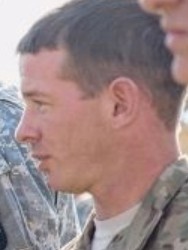

Synopsis:
The President of the United States of America, authorized by Act of Congress July 9, 1918 (amended by an act of July 25, 1963), takes pleasure in presenting the Silver Star to Sergeant First Class John P. Fleming, United States Army, for gallantry in connection with military operations against an opposing armed force while serving with the 1st Battalion, 327th Infantry Regiment, 1st Brigade Combat Team, 101st Airborne Division, in support of Operation STRONG EAGLE on 13 July 2010. Early on that morning, about 200 enemy insurgents attacked the vehicle patrol base in Wanat, Afghanistan. The Taliban surrounded the remote base and its observation post, then attacked the village and its surrounding farmland. American heavy munitions were destroyed, U.S. lines were broken and the based was invaded. Faced with enemy fire, outnumbers, and in many cases wounded, Sergeant First Class Fleming and his fellow paratroopers fought desperately for each other, overcoming fear and willingly risking their lives to save others. Sergeant First Class Fleming's gallant actions and dedicated devotion to duty, without regard for his own life, were in keeping with the highest traditions of military service and reflect great credit upon himself, the 101st Infantry Division, and the United States Army.
Home Town: Alton, Illinois
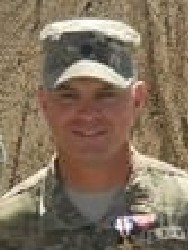

Citation:
The President of the United States of America, authorized by Act of Congress July 9, 1918 (amended by an act of July 25, 1963), takes pleasure in presenting the Silver Star to Lieutenant Colonel David S. Flynn, United States Army, for conspicuous gallantry and intrepidity as Commanding Officer, 1st Battalion, 320th Field Artillery Regiment, 2d Brigade Combat Team, 101st Airborne Division (Air Assault), during combat operations in support of Operation ENDURING FREEDOM in Western Arghandab District, Kandahar Province, Afghanistan which contributed directly to the overwhelming success of Operation Hamkari-Arghanciab from 10 July 2010 to 23 August 2010. Lieutenant Colonel Flynn's leadership, heroism, and judgment were inspirational to the task force. He regularly placed himself at great personal risk, demonstrated unwavering commitment to the men and women of his command, and inspired them to defeat a formidable for and protect the people of Western Arghandab. Lieutenant Colonel Flynn's bravery, selflessness, and courage under fire is in keeping with the finest traditions of the military heroism and reflects great credit upon himself, 1st Battalion, 320th Field Artillery Regiment, the 2d Brigade Combat Team, the 101st Airborne Division (Air Assault), Regional Command-South, and the United States Army.
FORD, SCOTT E.
Citation:
The President of the United States of America, authorized by Act of Congress July 9, 1918 (amended by an act of July 25, 1963), takes pleasure in presenting the Silver Star to Master Sergeant Scott E. Ford, United States Army, for exceptionally valorous conduct in the face of the enemy of the United States as Team Sergeant, Operational Detachment Alpha 3336 (ODA-3336), 3d Special Forces Group (Airborne), Special Operations Task Force - 33, Combined Joint Special Operations Task Force - Afghanistan, in support of Operation ENDURING FREEDOM on 6 April 2008. Sergeant Ford heroically fought for over an hour up a mountain while under intense enemy fire to rescue wounded members of his ODA pinned down by Insurgent fire. Sergeant Ford was pinned down in a wadi by heavy sniper, Rocket Propelled Grenade, and machine gun fire after initial contact, as the ODA Command and Control (C2) element was fixed by multiple Insurgent firing positions on the mountain. Sergeant Ford organized a counter assault to ascend up the mountain and reinforce his besieged teammates. Over the next hour, he proceeded to fight his way up the mountain under intense Insurgent fire, leading Afghan Commandos and killing several insurgents, some at very close range. Fighting with and leading his men across the wadi, up the mountain and terraced steps toward the village, Sergeant Ford exposed himself to Insurgent fire as he ran to render aid to a team mate wounded by shrapnel from an Rocket Propelled Grenade blast that blew him off his feet. When he arrived at the forward C2 element and with disregard for his own safety, he exposed himself to Insurgent fire by providing precision fire against Insurgent fighting positions, killing at least one Insurgent fighter. His courageous actions and accurate fire drew Insurgent fire away from his team mates, as Insurgent fighters focused their fire on Sergeant Ford. His selfless act allowed further casualty treatment in preparation for moving them down to the wadi for medical evacuation. His brave act and suppressive fire surely saved Coalition lives as Insurgent fire was now more accurate and hitting only inches away from the besieged element. Sergeant Ford exposed himself again to Insurgent fire by moving laterally across the mountain in order to verbally direct the remaining elements in the wadi to move forward and assist with casualty evacuation. As Sergeant Ford organized a Commando element to assist in moving casualties, he was shot in the chest plate by sniper fire. He immediately regained his feet and continued to suppress the enemy until his upper left arm was nearly shot off by a second sniper round. With a tourniquet on his arm to stop arterial bleeding, Sergeant Ford was able to conduct a courageous climb down the mountain, with the assistance of another teammate, under intense machine gun and sniper fire. Sergeant Ford never stopped leading his men and continued to organize forces to assist his comrades until he was physically incapable of fighting and had to be evacuated. His actions inspired his ODA members and the Afghan Commandos during the battle. His actions are in keeping with the finest tradition s of military heroism and reflect distinct credit upon himself, Special Operations Task Force - 33, Combined Joint Special Operations Task Force - Afghanistan, Special Operations Command Central and the United States Army.
Home Town: Athens, Ohio


Citation:
The President of the United States takes pleasure in presenting the Silver Star Medal to Sheffield F. Ford, III, Captain (Infantry), U.S. Army, for conspicuous gallantry and intrepidity in action while serving as the Detachment Commander, Operational Detachment Alpha 765 (ODA-765), Company A, 2d Battalion, 7th Special Forces Group (Airborne), during combat operations in support of Operation ENDURING FREEDOM, on 24 June 2006, at Pashmul, Kandahar, Afghanistan. Captain Ford’s heroic actions and courageous leadership were the decisive factors in the defeat of a determined and numerically superior enemy force. His actions are in keeping with the highest traditions of military heroism and reflect distinct credit upon himself, the Combined Special Operations Task Force-Afghanistan, Special Operations Command-Central, and the United States Army.
NARRATIVE TO ACCOMPANY AWARD
Captain Sheffield F. Ford, United States Army, distinguished himself by conspicuous gallantry in action as the Detachment Commander for Special Forces Operational Detachment Alpha-765, in support of Operation ENDURING FREEDOM. From 23 to 24 June 2006, while conducting Operation KAIKA, a cordon and search mission to capture or kill Taliban leadership in Panjawi District, Kandahar Province, Afghanistan, Captain Ford led his detachment throughout multiple engagements with an estimated 200 Taliban fighters. On 23 June, as the operation began, the detachment’s vehicles were slowed during their approach to the objective by restrictive terrain. Captain Ford immediately adjusted his assault plan by dismounting his force and moving rapidly toward the compounds. During the assault, close air support aircraft identified enemy activity in a compound to the south of the objective. Captain Ford personally organized and led an assault team toward the compound. He entered the structure, engaged enemy fighters in close combat and secured the target. Throughout this initial phase of the operation, while engaging Taliban forces, he continued to coordinate the activities of the other assault teams, direct close air support, and inform Task Force-73 of situational changes. Captain Ford established a perimeter around the objective and secured the entire objective area, when a large Taliban force counterattacked from several directions. Without hesitation, Captain Ford climbed into the turret of his vehicle and engaged enemy attackers with the M2 machine gun. Under an extraordinary volume of small arms, machinegun and rocket-propelled grenade fires, he remained in the exposed turret, ignoring the strikes of bullets and grenade fragments around him, accurately and calmly firing into the Taliban assault. A team member relieved him on the weapon, whereby he moved to the rear of the vehicle to operate the M240B machinegun. While firing, he simultaneously coordinated the defense of the patrol base with other detachment elements, directed close air support and maintained communication with Task Force-73 headquarters. He passed the radio handset to a detachment member and began adjusting the perimeter, while exposed to intense and effective enemy fires, in order to better defend against the assault. Captain Ford moved calmly and rapidly around the perimeter, directing fire and adjusting crew-served weapons. As the enemy fire increased, the defenders began to lose fire superiority against the overwhelming attack. Without concern for his own safety, Captain Ford moved among the Afghan positions, encouraging, directing and motivating them to rejoin the fight. He set a fearless example that inspired the young soldiers to defend with renewed vigor. Captain Ford continued to command and control the battle, while moving about the perimeter, completely exposed to the enemy’s fires, to ensure that the defense was properly executed. After an intense, extended exchange of fires, the Taliban withdrew. The following, day Captain Ford identified a compound situated on key terrain occupied by several enemy fighters. He dispatched the Team Sergeant with an assault team to attack and secure the compound. Immediately after the assault, an unexpectedly large Taliban force counterattacked, split the Team Sergeant’s force into two elements, and surrounded both groups. Captain Ford learned that the two American soldiers at the support by fire position were both wounded, and immediately organized a quick reaction force to reinforce the compound being held by the Team Sergeant and recover the two wounded soldiers from their isolated position. More enemy elements moved in, flooded the battlefield, surrounded Captain Ford’s patrol base, and attacked from three directions. Once again, without hesitation, he moved to the M240B machinegun and began firing from his exposed position into the attackers. He relayed instructions over the radio to organize the defense of the patrol base, coordinated the activities of three isolated dismounted elements, directed close air support, and updated his commander continuously, all while engaging attackers with a crew-served weapon. The enemy assault evolved into a well-coordinated attack from all directions, so Captain Ford relinquished his machinegun to a teammate and began adjusting his perimeter. The defense again began to falter in the face of extremely high volumes of enemy fire; the Taliban attackers were close enough to shout threats into the perimeter. Captain Ford shouted encouragement and moved from one position to another, despite accurate enemy fires and rocket-propelled grenades exploding in the air above him. He fired at the enemy, motivated his soldiers, and set a courageous example that energized the defenders and inspired new resolve. The Taliban assault was again forced to withdraw in the face of Captain Ford’s determined defense. He continued directing close air support to support the movement of his three isolated elements, coordinated link-up, and requested an ammunition resupply and medical evacuation aircraft. Under Captain Ford’s expert leadership and direction, all casualties were evacuated, and all friendly elements were consolidated and returned safely to the patrol base. Captain Ford’s courageous actions and determined leadership in the face of an overwhelming attack by a well-armed and determined enemy force prevented the destruction of his encircled detachment. His gallantry, dedication to duty, and selfless sacrifice exemplified the warrior ethos by decisively engaging and defeating a numerically superior force, rescuing two wounded soldiers, and forcing the Taliban retreat. The heroic accomplishments of Captain Ford reflect great credit upon himself, the Combined Joint Special Operations Task Force-Afghanistan, Special Operations Command Central, and the United States Army.
Born: at Dixon, California
Home Town: Dixon, California
Personal Awards: Silver Star (War on Terrorism), Bronze Star, Army Commendation Medal
FORTNER, CLINTON C.
Synopsis:
The President of the United States of America, authorized by Act of Congress July 9, 1918 (amended by an act of July 25, 1963), takes pleasure in presenting the Silver Star to Corporal Clinton C. Fortner, United States Army, for conspicuous gallantry and intrepidity in action against the enemy in support of Operation IRAQI FREEDOM in Iraq. His gallant actions and dedicated devotion to duty, without regard for his own life, were in keeping with the highest traditions of military service and reflect great credit upon himself, his unit, and the United States Army.
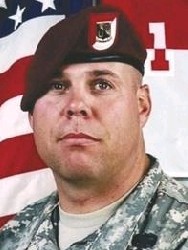

Citation:
The President of the United States of America, authorized by Act of Congress July 9, 1918 (amended by an act of July 25, 1963), takes pleasure in presenting the Silver Star to Sergeant Robert W. Fortner, United States Army, for extraordinary gallantry while serving as the Troop Medic in Troop B, 1st Squadron, 91st Cavalry (Airborne), 173d Airborne Brigade, during combat operations on 27 July 2007, in support of Operation ENDURING FREEDOM VII. Sergeant Fortner's courage under fire and commitment to mission accomplishment exemplify the Warrior Ethos. His heroism and devotion to duty reflect great credit upon himself, B Troop, Task Force SABER, Combined Task Force BAYONET, CJTF-82, and the United States Army. NARRATIVE TO ACCOMPANY AWARD: For exceptional heroism while placing his own life at extreme risk during military operations against a hostile force in Afghanistan in support of Operation ENDURING FREEDOM, on 27 July 2007. Sergeant Fortner's courage under fire distinguished him while serving as the medic for 2d Platoon, B Troop, 1st Squadron, 91st Cavalry. On the morning of 27 July 2007, elements of B Troop, 1st Squadron, 91st Cavalry, 173d Airborne Brigade Combat Team, having just completed a village assessment of Saret Kholeh, were moving east along the road south of the Landay Sin River. At approximately 0400Z an enemy force of over 100 fighters arrayed in multiple positions opened fire on the formation from high ground to the north, northeast, northwest, and south. One ANA and one U.S. Soldier, Private First Class Craig, were wounded in the initial attack. Sergeant Fortner treated them under fire and then positioned them to a more secure location so they could continue to fight. At that time large volumes of small arms and well-aimed sniper and RPG fire began to strike Sergeant Fortner's position. Troopers reported that Private First Class Craig's wounds had begun to bleed heavily again. As intense fire erupted around him, and with complete disregard for his own personal safety, Sergeant Fortner moved up the very steep hill to Private First Class Craig's position to control the bleeding. Volleys of RPG fire resulted in casualties further up the hill. Sergeant Fortner, with great personal courage, immediately began to move to their location. Despite the intense small arms, RPG, and sniper fire directed at him, Sergeant Fortner continued forward to treat his comrades. He was struck by a bullet in the right upper arm. Disregarding his own wounds, Sergeant Fortner continued to move under fire to provide care to his comrades before treating himself. He then removed the bullet from his own arm and assisted Private First Class Trapyline down the hill to the casualty collection point. By this time the QRF had arrived with M1114 gun trucks. As they supplied suppressive fire with .50 Caliber, MK-19 and M-240, Sergeant Fortner assisted in loading the four casualties. He refused to be evacuated himself, insisting on staying with his platoon. After a lull in which the enemy had reorganized and reinforced, the attack resumed. The Troop Command Post just to the east was struck by RPG fire killing Captain Bostick and injuring three others. Second Lieutenant Johnson made it to the Platoon CP where he was evacuated for disorientation secondary to the blast concussion. Staff Sergeant Lape and Private First Class Sultan moved to a position behind a large rock in the road. In spite of the extremely high volume of well-aimed small arms, sniper and RPG fire directed at him, and once again without any regard for his own safety, Sergeant Fortner rolled down the hill and low-crawled to their position. Enemy fire continued to impact all around him. He was able to provide lifesaving treatment to Private First Class Sultan. The QRF returned to the casualty collection point, Captain Bostick was loaded in one vehicle while Sergeant Fortner helped load Private First Class Sultan in another, still under heavy enemy fire. As the forward elements bounded together with the QRF to a more defensible location, they received heavy small arms and RPG fire from at least four directions. Six soldiers were wounded, all treated by Sergeant Fortner as they continued to move. Once at the HLZ, Sergeant Fortner continued to provide medical care and once again refused to be evacuated until all casualties were extracted. Only then did he depart the battlefield, accompanying the remains of his commander and an ANA soldier. Sergeant Fortner's extraordinary heroism under intense enemy fire saved the lives of his comrades. His exceptionally brave actions exemplify the Warrior Ethos and NCO Creed. His gallantry and professionalism stand as timeless examples of courage and selfless service to his fellow Soldiers in B Troop, 1st Squadron, 91st Cavalry (Airmobile), Task Force BAYONET, and CJTF-82.
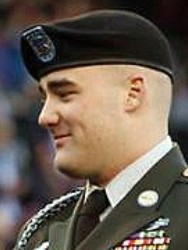

Synopsis:
The President of the United States of America, authorized by Act of Congress July 9, 1918 (amended by an act of July 25, 1963), takes pleasure in presenting the Silver Star to Specialist Daniel A. Foster, United States Army, for conspicuous gallantry and intrepidity in action while assigned as a M-204 Gunner in Delta Company, 1st Battalion, 187th Infantry Regiment, 3d Brigade Combat Team, 101st Airborne Division, in support of Operation ENDURING FREEDOM in Afghanistan on 21 May 2006. Specialist Foster's actions, superb courage and tactical expertise during combat operations contributed greatly to the defense of the 5th Afghan Border Police compound. His selfless service and dedication to duty are in keeping with the highest traditions of military service and reflect distinct credit upon himself, Leader Battalion, 3rd Brigade Combat Team (Rakkasan), and the United States Army.
FOWLER, PAUL A.
Synopsis:
The President of the United States takes pleasure in presenting the Silver Star Medal to Paul A. Fowler, Captain, U.S. Army, for conspicuous gallantry and intrepidity in action while Commanding the 2d Battalion, 63rd Armor Regiment, during combat operations in support of Operation IRAQI FREEDOM, during November 2004, in Iraq. During the battle for Fallujah, Captain Fowler executed a successful armored assault against several hundred enemy fighters in the northeastern part of the city, securing the flanks of battalions on either side. During a 14-hour firefight, he remained in position at the head of his company during house-to-house fighting in which nearly all of his tanks were attacked with grenades and small arms. On the third night of the operation, Captain Fowler led a house-to-house assault in southeast Fallujah that ended after 12 hours when his company destroyed a strong point occupied by 30 enemy fighters.
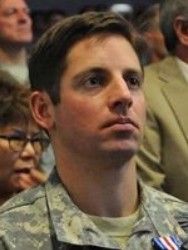

Synopsis:
The President of the United States of America, authorized by Act of Congress July 9, 1918 (amended by an act of July 25, 1963), takes pleasure in presenting the Silver Star to Captain David Fox, United States Army, for conspicuous gallantry and intrepidity in action against the enemy while serving with the 1st Battalion, 10th Special Forces Group (Airborne), in action on 17 December 2010, in support of Operation ENDURING FREEDOM in Kapisa Province, Afghanistan. On that date, Captain Fox, three French engineers, an interpreter, an Afghan National Security Forces (ANSF) commander and a member of his Special Operations Task Unit were conducting a site assessment for future placement of an ANSF checkpoint when the team was engaged by the enemy. From his position Captain Fox noticed that his security elements were taking small arms and Rocket-propelled grenade attacks from two separate enemy positions. He moved the survey element to the top of a ridgeline to engage the enemy when a devastating improvised explosive device detonated near the team, leaving Captain Fox unconscious, killing a French Captain and critically wounding the ANSF commander. Despite being disoriented when he regained consciousness, Captain Fox began to search for survivors and account for the element. Still dazed from the blast and with enemy rounds impacting within inches of him, Captain Fox began to administer trauma care by placing a tourniquet on the ANSF commander. Sergeant McKenna Miller reached Fox's position, and began to carry the KIA down the mountain, all-the-while under enemy fire. Now carrying Sergeant Miller's carbine, Captain Fox provided suppressive fire as they made their way down the mountain, taking cover in a dried up wadi until evacuation could be effected for the team, the KIA, and the wounded. His gallant actions and dedicated devotion to duty, without regard for his own life, were in keeping with the highest traditions of military service and reflect great credit upon himself, his unit, and the United States Army.
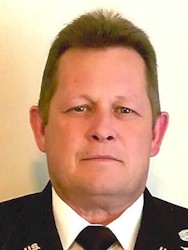

Synopsis:
The President of the United States of America, authorized by Act of Congress July 9, 1918 (amended by an act of July 25, 1963), takes pleasure in presenting the Silver Star to Chief Warrant Officer Five (CW-5) Terry L. Frabott, United States Army, for conspicuous gallantry and intrepidity in action against the enemy while serving with the 160th Special Operations Aviation Regiment (Airborne), in action on 2 May 2011 in support of Operation ENDURING FREEDOM in Afghanistan. Chief Warrant Officer Five Frabott was the flight leader for a Joint Task Force. He successfully penetrated a fully integrated and highly sophisticated air defense network. He delivered a ground force to the target and flawlessly reacted to multiple contingencies to include the loss of an aircraft and allowed the ground force to complete its extremely high-risk mission. His gallant actions and dedicated devotion to duty, without regard for his own life, were in keeping with the highest traditions of military service and reflect great credit upon himself, his unit, and the United States Army.
FRANCO, KENNETH R.
Synopsis:
The President of the United States takes pleasure in presenting the Silver Star Medal to Kenneth R. Franco, Staff Sergeant, U.S. Army, for conspicuous gallantry and intrepidity in action while serving as a Section Leader with E Troop, 9th Cavalry Regiment, 2d Brigade Combat Team, 3d Infantry Division, during combat operations in support of Operation IRAQI FREEDOM, on 22 March 2003, in Iraq. Staff Sergeant Franco's HMMWV was leading the convoy when his element came under attack by dozens of enemy fighters at a road block near An Najaf. Despite heavy enemy fire, Staff Sergeant Franco assessed the situation and made tactical decisions that benefited the entire troop. After leading his comrades through more than 48-hours of bitter fighting, his calm and decisive leadership resulted in more than 300 enemy killed.
Born: at Queens, New York
Home Town: Queens, New York
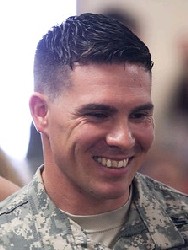

Synopsis:
The President of the United States of America, authorized by Act of Congress July 9, 1918 (amended by an act of July 25, 1963), takes pleasure in presenting the Silver Star to Sergeant First Class Anthony L. Fuentes, United States Army, for conspicuous gallantry and intrepidity in connection with military operations against the enemy while serving as a Platoon Sergeant in Company B, 2d Battalion, 27th Infantry Regiment, 3d Brigade Combat Team, 25th Infantry Division, in support of Operation ENDURING FREEDOM in Afghanistan from 8 to 16 October 2011. His gallant actions and dedicated devotion to duty, without regard for his own life, were in keeping with the highest traditions of military service and reflect great credit upon himself, his unit, and the United States Army.
Home Town: Jackson, California


Synopsis:
The President of the United States takes pride in presenting the Silver Star Medal (Posthumously) to Ray Michael Fuhrmann, II, Specialist, U.S. Army, for conspicuous gallantry and intrepidity in action while serving as a Medical Aidman with the 3d Battalion, 69th Armored Regiment, 1st Brigade Combat Team, 3d Infantry Division, during combat operations in support of Operation IRAQI FREEDOM, on 22 March 2005, in Iraq. On that date, Specialist Fuhrmann's unit came under enemy fire near Samarra, Iraq. Several Iraqi Army commandos fell and lay exposed in a field between the opponents. Without regard for his safety, Specialist Fuhrmann braved extremely heavy enemy fire and went to the Iraqis to treat their wounds. As he treated the wounded, he also fired his rifle and pistol to support his unit's counterattack. When he ran out of ammunition, he seized one of the wounded Iraqis' rifles and continued to fire in support of the assault and to protect the wounded. Specialist Fuhrmann's actions during the firefight saved the lives of six Iraqi commandos and helped prevail over the enemy.
Born: at Honolulu, Hawaii
Home Town: Novato, California
Personal Awards: Silver Star (War on Terrorism), Purple Heart
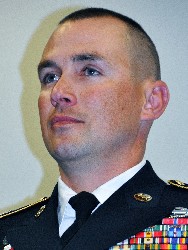

Citation:
The President of the United States of America, authorized by Act of Congress July 9, 1918 (amended by an act of July 25, 1963), takes pleasure in presenting the Silver Star to First Sergeant Gregory A. Fulton, United States Army, for gallantry in action against an enemy of the United States while serving as a Combat Engineer assigned to the 951st Engineer company in support of Operation ENDURING FREEDOM. On 10 August 2009, First Sergeant Fulton's element was contacted by an Explosive Ordnance Disposal element who reported they were actively engaged with Anti-Afghan Forces in the city of Pul-E-Alam. First Sergeant Fulton's element conducted a hasty route clearance to the city, where they were requested to provide a local dismounted security force to assist the Afghan National Army in clearing a building that held insurgents delivering small arms fire. First Sergeant Fulton immediately and without reservation dismounted his vehicle and took charge of an ad-hoc twelve man United States-Afghan assault element. Without regard for his own safety, he led his team into the building to neutralize the enemy forces. The assault team methodically cleared each floor, encountering an increasing amount of small arms fire causing multiple casualties as they closed in on the enemy. Finding themselves in a grave and dangerous situation, First Sergeant Fulton and his team developed an improvised breaching device that allowed them to neutralize the remaining insurgents and clear the building. His heroic actions in the face of the enemy were essential to the overwhelming success of the mission and saved Soldiers' lives. First Sergeant Fulton's selfless service reflects great credit upon himself, Task Force PIRATE, Combined Task Force STORM and the United States Army.

